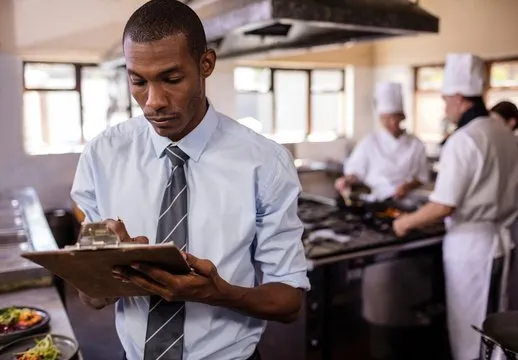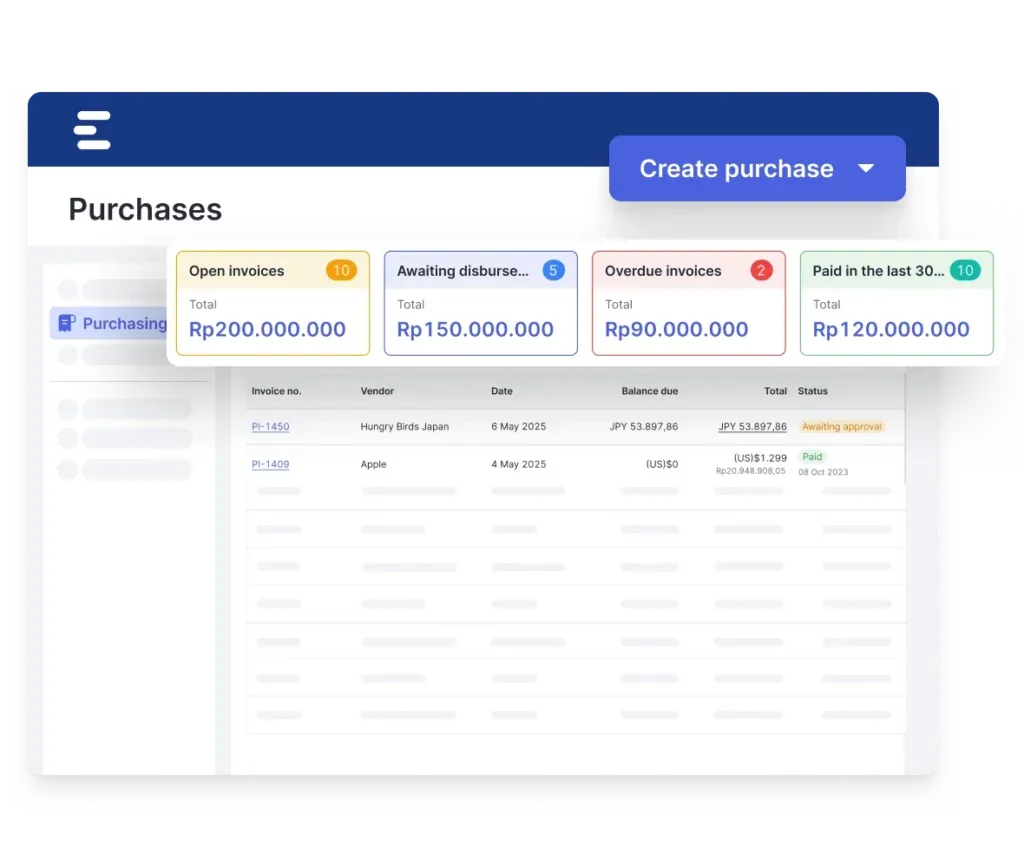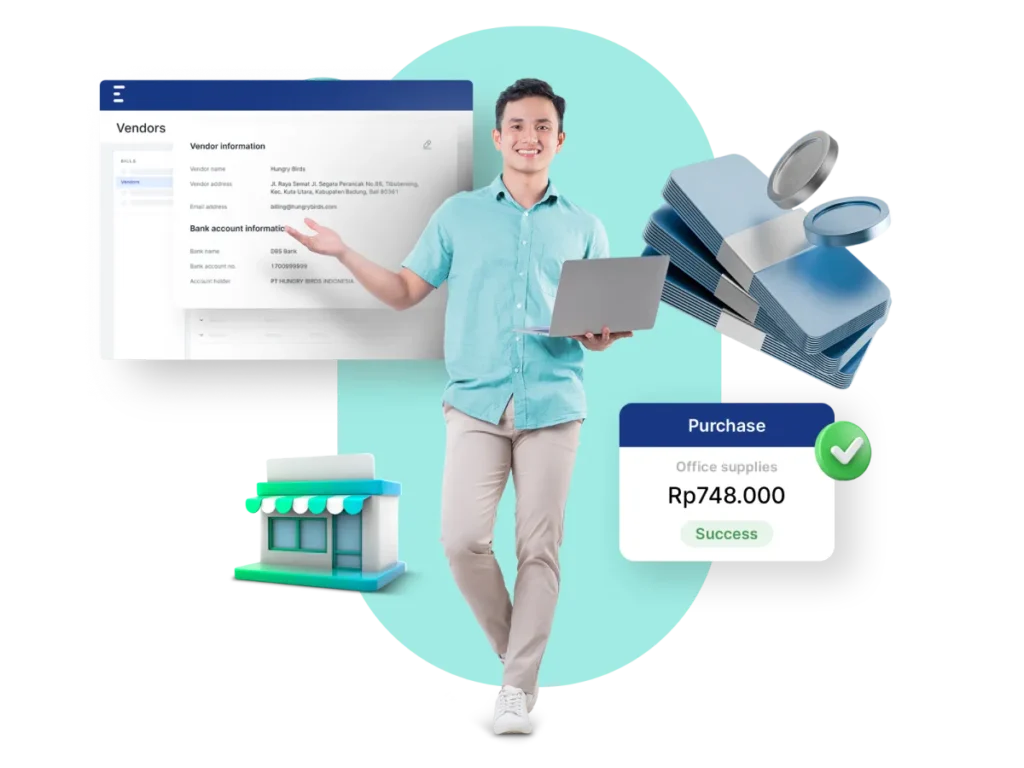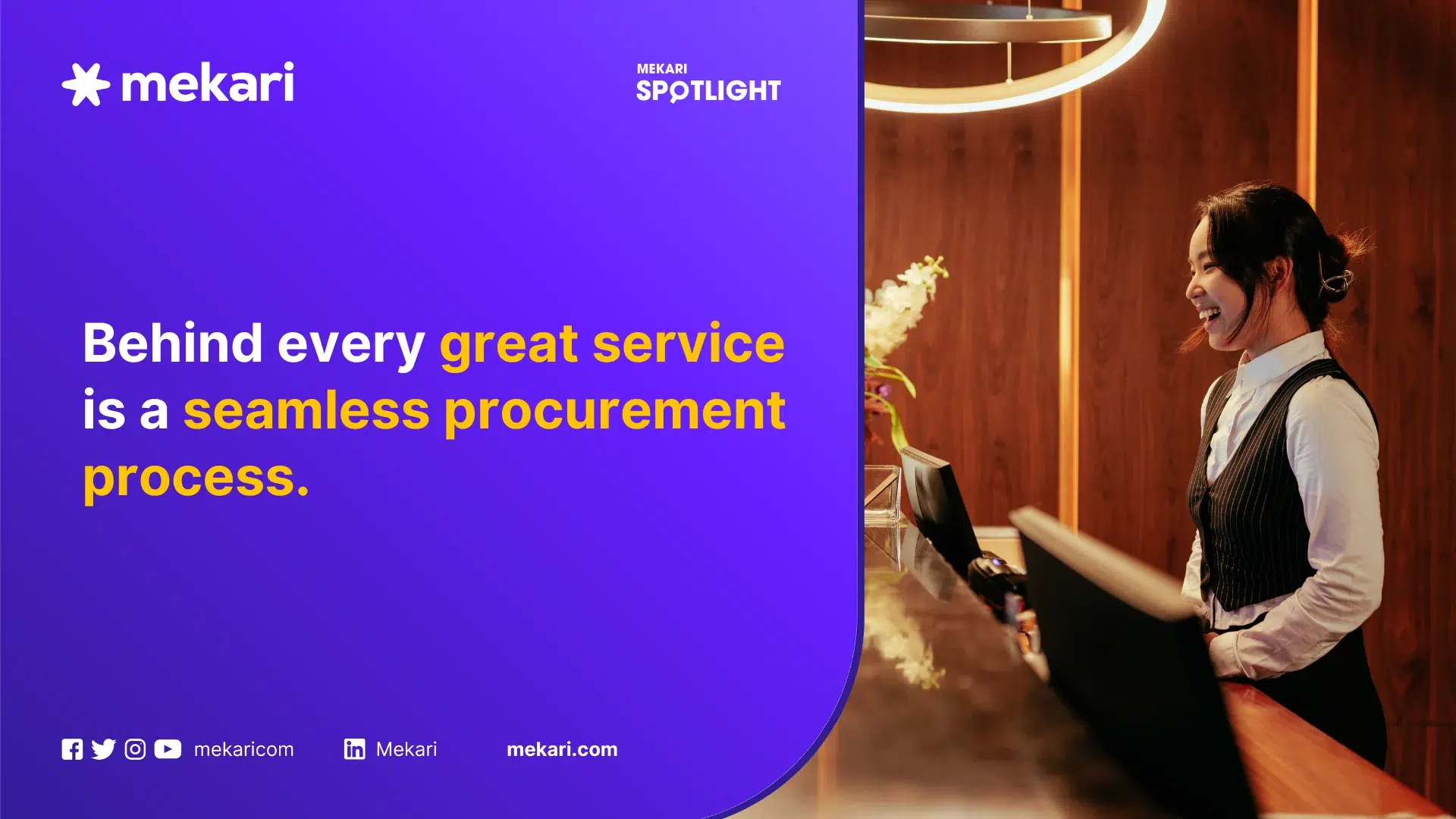Mekari Insight
- Hospitality procurement goes beyond day-to-day operational needs purchasing. It functions as a strategic lever that shapes efficient cost structure, profitability, and good guest experience.
- Adopting digital procurement tools enables seamless purchasing strategy, including better supplier management, faster approvals, and real-time cost tracking.
- Mekari Expense Purchase is built for hospitality teams. With automated workflows, vendor collaboration tools, and full spend visibility, it’s the smarter way to manage hospitality procurement end to end.
Behind every great hotel stay or dining experience, there’s a procurement team making sure everything runs smoothly—from fresh ingredients and high-quality cookware in the kitchen to clean sheets in the guest rooms.
Hospitality procurement is all about sourcing the right goods and services to keep daily operations moving and guests happy. And it’s no small task.
With procurement costs making up 20–30% of a hospitality business’s operating budget, smarter purchasing can have a real impact on both service quality and profit margins.
Whether it’s food and beverages, maintenance, or furniture, efficient procurement helps businesses stay agile, control costs, and deliver the kind of experience that keeps guests coming back.
Key components of procurement for hospitality industry
With these six components in place, hospitality businesses can maintain smooth operations, control costs, and consistently deliver excellent guest experiences.
1. Needs assessment
Start by identifying what each department—kitchen, housekeeping, maintenance, front desk—needs to maintain seamless daily operations. This clarity helps prevent overstocking and ensures the right items are always available.
2. Supplier sourcing and selection
Conduct market research, issue RFPs or RFQs, and evaluate suppliers based on price, quality, delivery reliability, and ethical practices. Establishing long-term partnerships ensures consistent supply and fosters trust.
3. Purchasing and contract management
Negotiate clear contract terms (prices, delivery timelines, payment, quality standards), issue purchase orders to formalize agreements, and manage vendor relationships with structured oversight.
4. Receiving and inspection

Inspect every delivery—confirming quantity and quality against purchase orders. Any mismatch can affect guest satisfaction or result in unnecessary costs.
5. Invoice matching and payment processing
Match invoices with purchase orders and delivery receipts before processing payments. This step ensures accuracy and prevents discrepancies.
6. Spend tracking and performance analysis
Leverage procurement technology to monitor total spend, measure supplier performance, and identify opportunities for cost savings and process optimization.
Read more: 25 Essential Business Expense Categories & How to Optimize ItImportance of procurement for hospitality industry
Strategic procurement is a vital tool that drives efficiency, enhances guest satisfaction, cuts costs, and keeps hospitality businesses ahead of the competition.
1. Operational efficiency
Hospitality procurement streamlines the entire purchasing process; sourcing ingredients to replenishing linens, using automated workflows and centralized systems. This frees up staff time and reduces errors, boosting operational speed.
2. Guest satisfaction
The quality of every item; fresh produce, clean towels, or polished furniture, directly shapes the guest experience. Thoughtful procurement that prioritizes consistency and quality can elevate service, leading to better reviews and loyalty.
3. Cost control & competitive advantage
By negotiating bulk rates, automating spend tracking, and using data-driven insights, hospitality teams can reduce costs and improve profitability.
With lower purchasing costs, hotels, restaurants, and other hospitality businesses can allocate more budget to other key business areas, such as service quality or marketing initiatives.
Read More: 10 Best Expense Management Software for Corporate & Business4. Vendor & Supplier Relationship Management
Strong supplier partnerships ensure consistent quality, reliable lead times, and agility during demand swings, which maintains a consistent supply chain.
Positive relationships with suppliers also unlocks favorable pricing, higher quality and service levels, and opportunities to collaborate or even innovate on hospitality products and guest experiences.
Challenges in hospitality procurement
By addressing these challenges, hospitality businesses can improve resilience, cost-efficiency, and service quality across the board.
1. Supply chain disruptions & unpredictable demand
Global events like seasonal demand changes, natural disasters, or logistics delays often create shortages and price volatility, making it difficult to secure consistent supply and stable costs.
2. Maintaining consistent quality
Ensuring uniform standards; whether it’s fresh produce in one kitchen or linens across multiple properties requires rigorous quality control and frequent inspections, which can be complex and resource-intensive .
3. Managing costs amid inflation & currency fluctuations
Rising input costs and volatile exchange rates make budgeting challenging, demanding proactive cost planning and flexible procurement strategies.
4. Vendor management complexity
Dealing with a diverse global supplier base each with varying standards, lead times, and reliability adds layers of complexity to relationship management and compliance.
5. Legacy system integration & lack of real-time data
Fragmented or outdated systems hinder access to real-time inventory, purchasing, and vendor data, slowing down decision-making and reducing workflow efficiency.
6. Compliance risks & maverick spending
Without standardized processes and controls, unauthorized purchases and policy deviations can occur leading to compliance breaches, unexpected costs, and audit challenges.
Read more: Expense Reimbursement Guide: Best Practices and SolutionsHow procurement software can transform hospitality operations
In summary, procurement software helps hospitality teams cut manual work, reduce costs, improve supplier relations, and make smarter decisions all while maintaining transparency and operational agility.
1. Enhance operational efficiency
Automating tasks like purchase orders, approval workflows, and inventory tracking frees your team from manual work.
For example, a leading hotel chain implemented a cloud-based procurement platform and saw faster PO processing and a huge boost in efficiency across 850 properties.
2. Achieve cost savings
Smart spend analytics and supplier management uncover hidden savings. One hotel group reduced food and beverage costs from 31.9% to 25.2% of revenue by optimizing purchasing via software tools.
Read more: Tail Spend Management: Cut 10% Costs with Tail Spend Automation3. Increase transparency & accountability
A centralized system gives full visibility into transactions, reduces unauthorized spending, and optimizes compliance. One hospitality company saw an 80% improvement in purchasing compliance after automating policies and approvals.
4. Strengthen supplier relationships

Digital platforms make it easier to collaborate with suppliers sharing catalogs, delivery timelines, and feedback all leading to more reliable service and better terms.
5. Optimize inventory levels
Real-time inventory monitoring prevents overstock or shortages. One restaurant-hotel platform reduced buying costs by 10% using AI-backed procurement controls.
6. Enable data-driven decisions
Advanced reporting reveals usage patterns, cost trends, and supplier performance creating a feedback loop that drives better strategies. Approximately 76% of hotel operators say procurement tech helps them stay competitive.
7. Streamline communication & integration
Modern procurement tools often integrate with ERP and POS systems, support mobile access, and manage multiple properties from one dashboard ideal for chains and franchise networks.
8. Improve compliance & risk mitigation
Built‑in compliance checks, audit trails, and approval workflows reduce errors and fraud. For example, a global hotel chain automated 3-way invoice matching (PO, receipt, invoice) and saw dramatic improvements in control and accuracy.
Best practices for streamlined hospitality procurement
To truly optimize your procurement for hospitality industry process, it’s not just about doing things right, it’s about doing them smarter.
Here’s how best practices, supported by the right software, can help you streamline operations and boost performance across the board.
1. Define clear demand profiles
Start by mapping out needs from sales and events, then feed that data into your procurement system. This ensures automatic tracking of consumption trends and seasonality so you never order too much or too little.
Procurement software can auto-trigger reorder alerts or send purchase order requests to vendors instantly improving accuracy and reducing waste.
2. Build smart supplier evaluation
Use your platform to create a vendor database with grading metrics price reliability, delivery time, quality, sustainability.
Procurement software can auto-invite bids based on past performance, helping you make data-backed decisions on supplier selection and ongoing relationships.
This strategic sourcing process lowers total cost of ownership, drives higher value-for-money, and reduces supplier risk.
3. Automate orders with smart policies
Configure your software to auto-generate purchase orders when inventory hits a threshold.
Approval flows automatically route to managers, preventing unauthorized orders. Plus, built-in item restrictions keep unnecessary purchases in check ideal for chains managing multiple locations.
4. Inspect and log deliveries efficiently
Use mobile receiving tools to instantly check received goods against POs, capture images or note temperature details for perishables, and flag issues immediately. You build audit logs supporting quality control and simplifying vendor claims.
5. Store smart & track stock levels
Your software updates stock in real time and can suggest transfers between locations to avoid stockouts. Coupled with expiry alerts, this helps reduce spoilage and maintain food safety standards with minimal manual effort.
6. Streamline invoicing & payments
After delivery, the system auto-matches invoice to PO and receipt. You get alerts for mismatches, reducing errors and saving months of manual reconciliation.
This ensures you pay on time and maintain good supplier relations, often unlocking early payment discounts.
7. Automate Account Payable (AP)
Turn invoices into touchless workflows with e-invoicing, OCR capture, three-way matching, and custom policy-based approvals—plus a vendor portal for status visibility for both parties.
This cuts cycle times and processing costs, reduces errors and fraud, helps capture early-payment discounts, and syncs cleanly to your ERP/GL for accurate accruals and DPO tracking.
8. Monitor spend and performance
Leverage dashboards to spot top spend categories, track vendor reliability, and identify cost-saving chances. Hotels implementing end-to-end procurement tools have reported 5–40% cost reduction and major efficiency gains.
9. Integrate systems & enable mobility
Modern procurement platforms offer ERP, POS, PMS or expense management and accounting integration plus mobile-ready apps.
Your kitchen, housekeeping, and finance teams can coordinate in real time even offline in backrooms minimizing delays and miscommunication.
10. Foster continuous improvement
Supply chain risks, sustainability goals, and food safety requirements evolve. Your procurement platform can flag stale contracts, prompt re-contracting, track supplier certifications, and support ESG-friendly sourcing so you stay ahead.
Best procurement software for hospitality industry
Managing procurement in the hospitality sector demands speed, accuracy, and cost-efficiency; three things that Mekari Expense Purchase delivers effortlessly.
As an all-in-one procurement solution, it simplifies every step of the sourcing process, from purchase requests to approval workflows and expense tracking.

To complement that, the Vendor Portal from Mekari Expense gives suppliers direct access to submit invoices, track payments, and collaborate transparently—cutting down on back-and-forth emails and manual data entry.

Together, these tools help hospitality businesses reduce administrative workload, avoid costly delays, and maintain stronger vendor relationships.
If you’re looking to streamline your procurement process without compromising control or compliance, Mekari Expense Purchase is the smart choice.
References
Order.co. ”Better Hospitality Procurement: Best Practices & Processes”
Foodnotify. ”6 Steps to Streamline Hospitality Procurement”

